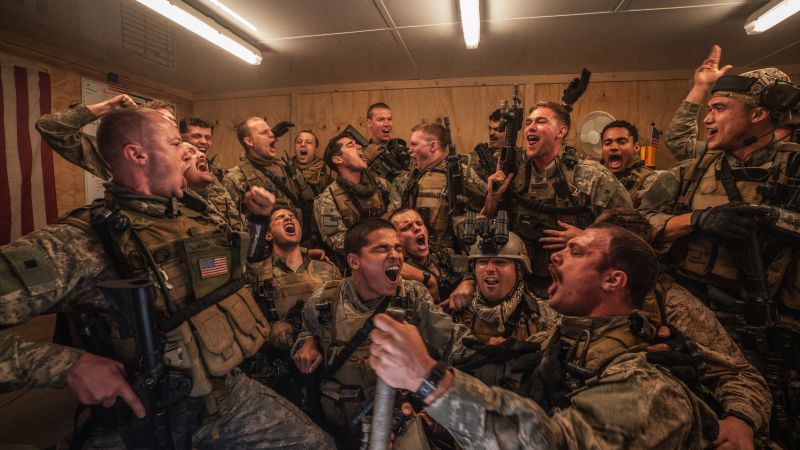In the cinematic landscape, “Warfare” emerges as a fresh exploration of war and its implications, co-directed by the acclaimed Alex Garland, known for works like “Civil War” and “Ex Machina,” and former U.S. Navy SEAL Ray Mendoza. The film doesn’t seek to sugarcoat its themes; instead, it kicks off with a humorous juxtaposition. The nostalgic strains of Eric Prydz’s 2004 anthem “Call on Me” fill the theater while the iconic music video flashes on screen, showcasing the carefree antics of actors like John Travolta and Jamie Lee Curtis in the 1985 film “Perfect.” This scene establishes the initial lightheartedness of young soldiers, who at first resemble typical spring breakers, contrasting sharply with their stark realities.
As the narrative unfolds, “Warfare” draws from the personal experiences of Mendoza and his military unit during a challenging surveillance assignment in Ramadi, Iraq, in 2006. A pivotal moment occurs when Mendoza’s team finds themselves under sudden attack, manifesting a harsh and visceral fight for survival against overwhelming odds. The film captivates audiences not just through its action but by highlighting the raw emotions and camaraderie of its young ensemble cast. Actors such as Charles Melton, Will Poulter, Joseph Quinn, Kit Connor, and Noah Centineo contribute to a portrayal that eschews typical heroics in favor of a nuanced exploration of teamwork in the military context.
The co-directors, Garland and Mendoza, undertook extensive research, interviewing other unit members to craft a narrative that stays true to the intricacies of their reality. “It’s an exercise in trying to recreate a real sequence of events as accurately as possible,” Garland stated. This approach lends the film an authenticity that is often lacking in war cinema. Mendoza emphasizes this perspective by critiquing prior war films that, in his opinion, miss the mark in how they depict the veteran experience. Mendoza’s commitment to authenticity is evident as he leads his cast through a rigorous three-week boot camp, ensuring that each actor gains necessary military training and an understanding of the psychological states involved in such high-pressure environments.
The training sessions enhance camaraderie among the cast, leading to a familial bond that enriches their performances. Will Poulter noted that the boot camp not only equipped them with technical skills to portray Navy SEALs effectively but also strengthened their emotional connections, enhancing the film’s overall authenticity. This depth is crucial as the film navigates through the complexities of violence and trauma—a theme echoed by Quinn, who emphasizes the stark contrast between the mundane moments of boredom encountered in the military and sudden perilous engagements.
What sets “Warfare” apart from other war narratives is its candid depiction of violence. Rather than glorifying battle moments, the film highlights the consequences and psychological aftermath of violent encounters. Mendoza articulates that the process of reconstructing these events served as a means for him to confront latent trauma and gain a deeper understanding of why certain experiences remain with veterans long after the physical conflicts have ceased. It’s a journey of grappling with one’s past and sharing those struggles with loved ones.
While those involved in the film resonate with its themes personally, Garland holds a distinct perspective, suggesting the film isn’t crafted with a specific agenda but attempts to share information honestly. He believes that the film’s lack of a overt message should not undermine the narrative’s emotional weight. The closing moments offer a poignant resolution that contrasts with the prior intensity, leaving audiences with lingering thoughts about the bonds formed in the face of adversity.
The cast’s commitment extended beyond mere performances, illustrated by their choice to get matching tattoos that read “Call on Me,” symbolizing their deepened bond as both actors and brothers-in-arms. This symbolic act reiterates their shared experience and underscores the film’s thematic emphasis on camaraderie and support among soldiers.
“Warfare” is set to hit theaters in the U.S. and U.K. on April 11, signaling its arrival as a significant entry into the realm of war films, one that promises a compelling depiction of youth, friendship, and the harsh realities of combat.











